Speeches Shim
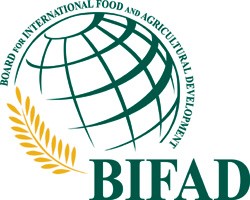
The Board for International Food and Agricultural Development (BIFAD) is a seven-member, presidentially appointed advisory board to USAID established in 1975 under Title XII of the Foreign Assistance Act, as amended, to ensure that USAID brings the assets of U.S. universities to bear on development challenges in agriculture and food security and supports their representation in USAID programming.
On Friday, January 14, 2022, President Biden announced his intent to appoint new members to the Board for International Food and Agricultural Development (BIFAD) in the White House Statement and Release here. USAID is pleased to welcome these new members to advise USAID in the fight to end hunger. We invite you to learn about their impressive backgrounds and expertise in the links provided below.
BOARD MEMBERS
- Laurence B. Alexander, BIFAD Chair and Chancellor of the University of Arkansas at Pine Bluff
- Pamela K. Anderson, Director General Emerita, International Potato Center
- Marie Boyd, Associate Professor, University of South Carolina School of Law
- Rattan Lal, Distinguished Professor, The Ohio State University
- Saweda Liverpool-Tasie, Associate Professor, Michigan State University
- Henri G. Moore, Vice President/Head of Responsible Business, GSK Consumer Health
- Kathy Spahn, President and CEO of Helen Keller International
For questions, please contact the Executive Director for BIFAD, Clara Cohen, at ccohen@usaid.gov or 202-712-0119.
Agricultural Research and Development: Essential to Accelerate Progress and Recovery Towards Inclusive Agricultural Transformation in Africa
February 21, 2022 - A new podcast episode of the African Green Revolution Forum 2021 (AGRF2021) series features key findings of the BIFAD-commissioned report, Agricultural Productivity Growth, Resilience, and Economic Transformation in Sub-Saharan Africa: Implications for USAID, and a discussion among panelists from Kenya, Nigeria, and South Africa about necessary actions for accelerating progress and recovery toward inclusive agricultural transformation in sub-Saharan Africa.
The essential role of agricultural research and development for productivity-led agricultural growth in sub-Saharan Africa emerged as a clear theme throughout the episode.

Podcast moderator, Agnes Asiimwe Konde, Vice President for Program Innovation and Delivery at AGRA, and lead author of the report, Thom Jayne, Professor Emeritus at Michigan State University and Advisor to the President of the African Development Bank, discuss key findings of the Board for International Food and Agricultural Development (BIFAD)-commissioned study. Agricultural production growth has been a major driver of economic transformation in sub-Saharan Africa over the past 20 years and is linked to notable improvements across other development indicators in health, education, and government effectiveness. However, this productivity growth is primarily attributable to land area expansion—a concerning trend considering environmental costs of deforestation and biodiversity loss. Pointing to several cases in Africa and Asia, countries that invest substantially in agricultural research, development, and extension (R&D&E) have achieved more rapid productivity growth rates. This growth is fostered through effective agricultural R&D&E systems, land tenure, finance, policy, infrastructure, market access, and other enabling environment factors that promote innovation and adoption of technologies and practices.
Responding to these findings and reflecting upon their own research and experiences, panelists offer recommended actions to accelerate productivity-led growth—a few of which are summarized below.
Increase total government investment in agricultural research and development. Panelist Lulama Traub, Technical Committee Member for the Regional Network of Agricultural Policy Research Institutes (ReNAPRI; an African-led, regionally coordinated group of national agricultural policy research institutes), points to data suggesting that most African countries are spending well below 1% of agricultural gross domestic product (GDP) on agricultural research and development. Of the few countries spending 1% or greater of agricultural GDP in agricultural research and development (R&D), most measured positive annual growth in agricultural output with growth attributed to increased total farm productivity and input use, rather than through land expansion.
Create incentives and protect investments to capitalize private-sector investments in areas that are critical to productivity. Panelist Tosin Ojo, Vice President of the Sahel Group, encourages private sector-led research, with governments incentivizing and protecting private-sector investments in R&D. Panelists encourage capital investments in agricultural R&D that have great potential for return on investment and that respond to emerging challenges such as climate change adaptation and genetic potential for drought tolerance.
Organize and foster symbiotic partnerships between the private sector, governments, and research and higher education institutions. Wandile Sihlobo, Chief Economist of the Agricultural Business Chamber of South Africa, points to the value of public-private partnerships to leverage the capacities of partner organizations. Wandile’s examples highlight the role of universities and research institutions in identifying evidence-based policy recommendations, objectively advising both the private and public sectors.
In concluding remarks, study lead author Thom Jayne highlights three “ingredients” to building strong agricultural research and development in Africa: 1) strengthening partnerships and coordination between national research organizations and international research institutes, including the CGIAR system, 2) building the political will to support increased public investment in agricultural R&D; and 3) leveraging the staggering increase in human capital, including the 14-fold increase of youth attending post-secondary education in the past two decades, by incentivizing careers in agricultural research.
Listen to the podcast and share your comments and ideas here (Podcast Episode 17).
Note: The views shared in this post and any shared resources are those of the author and speakers and do not necessarily reflect the formal opinion of USAID or BIFAD.
New Board for International Food and Agricultural Development (BIFAD) Appointments
On January 14, 2022, President Biden announced his intent to appoint new members of the Board for International Food and Agricultural Development. The Board for International Food and Agricultural Development (BIFAD) is a seven-member, presidentially appointed advisory committee to USAID established in 1975 under Title XII of the Foreign Assistance Act to ensure that USAID brings the assets of U.S. universities to bear on development challenges in agriculture and food security and supports their representation in USAID programming.
Dr. Laurence B. Alexander, Chancellor of the University of Arkansas at Pine Bluff, has been appointed as BIFAD Chair along with new members: Dr. Marie Boyd, Associate Professor of Law at the University of South Carolina; Dr. Rattan Lal, 2020 World Food Prize Laureate, Distinguished University Professor of Soil Science, and Director of the Center for Carbon Management and Sequestration at The Ohio State University; Dr. Saweda Liverpool-Tasie, Associate Professor in the Department of Agricultural, Food, and Resource Economics at Michigan State University; Ms. Henri Moore, Vice President and Head of Responsible Business, GSK Consumer Health; and Ms. Kathy Spahn, President and Chief Executive Officer of Helen Keller International. The announcement also extends the appointment of Dr. Pamela Anderson, Director General Emerita of the International Potato Center.
Serving as thought leaders and conveners of diverse expert dialogues, the Board has recently provided evidence-based recommendations to USAID on protecting and advancing nutrition and food security outcomes during COVID-19 response and recovery; improving the agricultural sector and food security in conflict-affected and fragile contexts; and measuring the benefits of global agricultural development investment on the U.S economy. A newly published report commissioned by the Board puts forward a priority agenda for promoting economic transformation and resilience in the sub-Saharan region.
These new appointments position the Board to reflect the priorities of the new administration and continue to support USAID’s global commitments in agriculture and food systems through initiatives such as the revised US Government Global Food Security Strategy and U.S. Government Global Food Security Research Strategy; responding to climate change; expanding diversity, equity, and inclusion; and strengthening local systems. Dr. Alexander’s appointment as BIFAD Chair marks the first time the board is chaired by a leader of an 1890 public land grant university, acknowledging the valuable contributions of Historically Black Colleges and Universities (HBCUs) and presenting opportunity to further strengthen USAID’s partnerships with HBCUs and other U.S Minority Serving Institutions. USAID is proud to welcome the new BIFAD members, encouraged by the diversity and depth of expertise, organizations, and experience among the new members. We look forward to incorporating their deep expertise, input and energy to help advance USAID’s objectives in the important years to come.
USAID thanks outgoing members for giving generously of their time and talent and for their years of outstanding service, contributions, and support to BIFAD: Mark E. Keenum, BIFAD Chair & President, Mississippi State University; James M. Ash, Food & Agribusiness Group Leader, Husch Blackwell LLP; Gebisa Ejeta, Distinguished Professor, Purdue University; Richard L. Lackey, Chairman and CEO, World Food Bank Inc.; David Matthews, Business Development Officer, United Community Bank; and Mark McDaniel, Partner, McDaniel and McDaniel Attorneys, LLC.
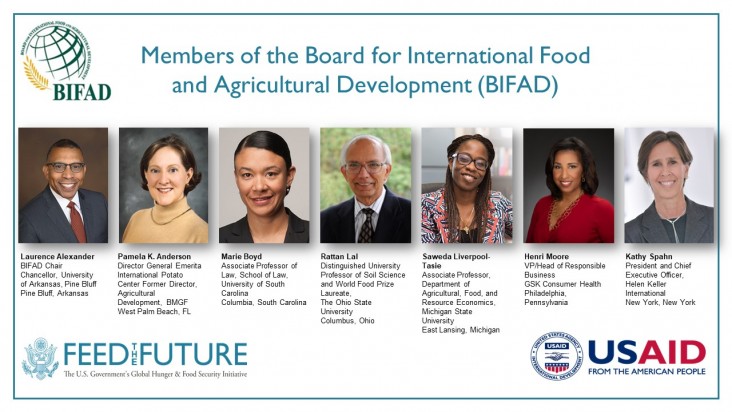
Agricultural Innovation for African Sustainability and Resilience: A World Food Prize Borlaug Dialogues Side Event
October 22, 7:30 am to 9:00 CDT
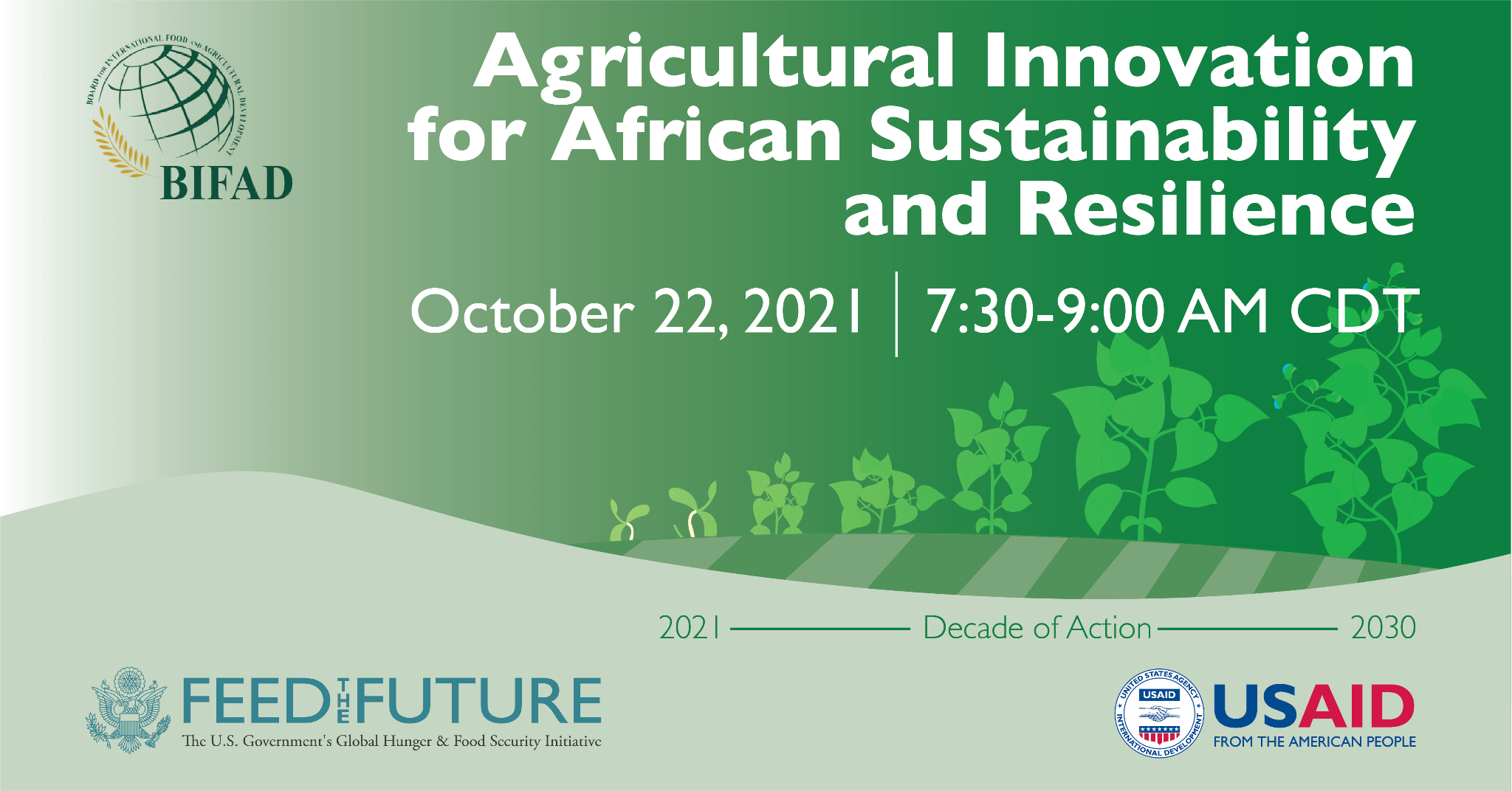
To view the recording, click here.
You are invited to join this World Food Prize Borlaug Dialogues side event, hosted by the Board for International Food and Agricultural Development (BIFAD) and USAID.
Investments in agricultural research and development generate among the greatest impacts on agricultural productivity growth and poverty reduction per dollar spent, though most African governments invest less than 1% of agricultural GDP in agricultural research.
This virtual event is structured as a dialogue, with participant interaction, building on earlier events from the UN Food Systems Summit and AGRF 2021, convening leaders to identify the priority actions for investments in agricultural research, development, and extension and an enabling policy environment.
The event puts forward to regional and global leaders recommendations in three priority areas necessary to respond to climate change and build more resilient food systems: 1) priorities to improve capacities of government ministries and agencies to promote technical innovation and to respond to major shocks in food systems; 2) operationalizing recommendations for balance in research partnerships between international research institutions and national agricultural research systems; and 3) communicating research results back to policy makers to influence policy change and investments.
Presentations and discussion will draw from recent evidence, including the BIFAD-commissioned study, Agricultural Productivity Growth, Resilience, and Economic Transformation in Sub-Saharan Africa: Implications for USAID, and look to build or expand upon recommendations put forward in the 2021 African Agricultural Status Report and a previous BIFAD co-hosted UN FSS Science Days event.
Special thanks to the World Food Prize Foundation for the invitation to host this side event. Please visit the WFP website to learn more and register for the 2021 Borlaug Dialogue. Note: Registration in the Borlaug Dialogues is not required to join this side event. Register for the side event at the link above.
AGRF 2021 Pre-Summit Dialogue: Agricultural Transformation for Sustainable and Resilient Food Systems
To view the recording, click here.
On September 6, 2021, BIFAD, USAID, the African Development Bank, the World Bank, the Regional Network of African Policy Research Institutes (ReNAPRI), and the Alliance for African Partnership co-hosted an Alliance for a Green Revolution in Africa Forum (AGRF) Pre-Summit panel discussion to identify conditions and properties of resilient, sustainable food systems and propose policies and programs for African governments to achieve them. The discussion drew from country case studies and recent evidence, including work commissioned by BIFAD, a World Bank publication, and an African Development Bank report, on linkages between agricultural productivity, economic transformation, and resilience.
2021 Call for Nominations: BIFAD Award for Scientific Excellence in a Feed the Future Innovation Lab
The Board for International Food and Agricultural Development (BIFAD), is pleased to announce the Call for Nominations for the 2021 BIFAD Awards for Scientific Excellence in a Feed the Future Innovation Lab. The Feed the Future Innovation Labs draw on the expertise of top U.S. universities and developing country research institutions to tackle some of the world’s greatest challenges to strengthen the resiliency of food and agricultural systems.
Click here for more information and here to submit a nomination.
The Critical Role of Research and Development in Resilient and Sustainable Food Systems
A Side Event of the U.N. Food Systems Summit Science Days
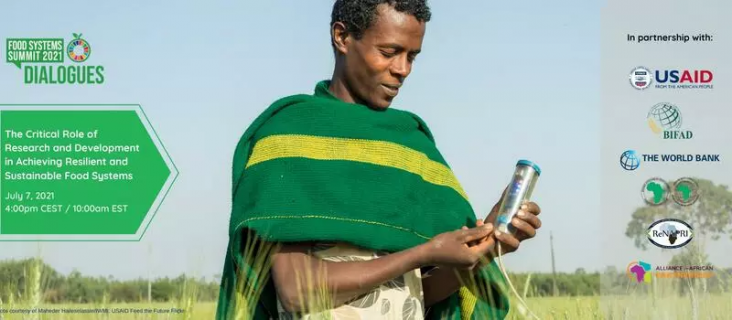
Hosted by USAID, the Board for International Food and Agricultural Development (BIFAD), the World Bank, the African Development Bank, the Regional Network of Agricultural Policy Research Institutes, and the Alliance for African Partnership
July 7, 2021, 10:00 AM to 11:30 AM (GMT -4) (90 minutes, virtual)
To register, click here.
Click here for the recording, summary of key points and calls to action, and official dialogue feedback to the UN 2021 Food Systems Summit.
Please join this panel presentation and open forum discussion, a side event to the U.N. Food Systems Summit Science Days. Leaders across the private and public research and development sectors identify and discuss the key actions needed to advance adaptive agricultural research and to develop an enabling policy environment to support the steady stream of technological innovations necessary for resilient and sustainable food systems.
The discussion will review evidence of evolving economic transformation and progress towards resilience in sub-Saharan Africa from the BIFAD-commissioned Agricultural Productivity Growth, Resilience, and Economic Transformation in Sub-Saharan Africa report and the World Bank publication, Harvesting Prosperity: Technology and Productivity Growth in Agriculture. Together, panelists and participants will identify lessons learned from countries in which substantial investments in adaptive agricultural research and development and extension systems have shown the catalytic role of productivity-led agricultural growth in contributing to employment, resilience, and economic transformation.
Launch of BIFAD-Commissioned Report, Agricultural Productivity Growth, Resilience, and Economic Transformation in Sub-Saharan Africa: Implications for USAID
To read the full report, click here
To read the policy brief, click here.
A new BIFAD-commissioned report, Agricultural Productivity Growth, Resilience, and Economic Transformation in Sub-Saharan Africa: Implications for USAID, reviews the evidence of evolving economic transformation and progress towards resilience in sub-Saharan Africa (SSA) and provides a priority agenda for promoting transformation and resilience in the region, recognizing the varying challenges faced by fragile, low-income, lower-middle-income, and resource-rich countries.
Key Findings: Mounting evidence points to profound economic transformation in SSA since the early 2000s. Across a broad range of indicators—health, life expectancy, education, public service delivery, government effectiveness, and public investment in future economic transformation—most African countries have made remarkable progress. While agricultural production growth has been a major driver of SSA’s economic transformation and improvements in living standards, production growth has been achieved mainly through the expansion of cropped area rather than through productivity growth. Those countries in Africa and Asia that have made substantial investments in adaptive agricultural research and development and extension (R&D&E) systems have shown the catalytic role of productivity-led agricultural growth in contributing to employment, resilience, and economic transformation. The challenges from uneven economic growth and development across the low-income, lower-middle-income, fragile, and resource-rich states point to different programmatic responses.
Recommendations: The report recommends that USAID contribute to economic transformation and resilience by supporting African governments and other partners across the following opportunity areas: 1) Supporting COVID-19 recovery; 2) Accelerating productivity-led agricultural growth; 3) Expanding employment opportunities for young Africans; 4) Achieving economic empowerment for women; 5) Capturing the opportunities for intra-African agricultural trade and supporting the African Continental Free Trade Area (AfCFTA) agreement; 6) Reducing the rural infrastructural deficit; 7) Leveraging USAID strengths in institutional capacity development; and 8) Leveraging USAID convening power and U.S. global leadership in agricultural innovation.
Report Authors: T. S. Jayne is University Foundation Professor of Agricultural, Food and Resource Economics at Michigan State University. Louise Fox is Non-Resident Senior Fellow at the Brookings Institution, Visiting Scholar at the Blum Center for Developing Economies at the University of California Berkeley, and former Chief Economist at USAID. Keith Fuglie is Senior Economist at the U.S. Department of Agriculture Economic Research Service and formerly Senior Economist in the Bureau for Resilience and Food Security, USAID. Adesoji Adelaja is the John A. Hannah Distinguished Professor in Land Policy, Department of Agricultural, Food and Resource Economics at Michigan State University.
183rd BIFAD Public Meeting
Agricultural Growth, Economic Transformation, and the Journey to Self-Reliance: Implications for USAID Programming
October 13, 2020, 1:00 pm - 3:30 pm EDT (2.5 hours, virtual)
To see the agenda, click here.
To view the meeting recording, click here.
To see the meeting minutes, click here.
A public meeting of the Board for International Food and Agricultural Development (BIFAD), Agricultural Growth, Economic Transformation, and the Journey to Self-Reliance: Implications for USAID Programming, was held on October 13, 2020 from 1:00 pm to 3:30 pm EDT. A public comment period took place from 3:00 to 3:20 pm, EDT. The meeting was livestreamed livestreamed via Zoom.
The U.S. Agency for International Development (USAID) is reorienting its strategies, partnership models, and program practices to achieve greater development outcomes and strive toward a future where foreign assistance is no longer necessary. The approach, outlined in the Agency’s Policy Framework, emphasizes the concept of “self-reliance”—defined as the capacity and commitment of a country to plan, finance, and implement solutions to solve its own development challenges in an effective, inclusive, and accountable way.
BIFAD convened the meeting to better understand the concept of economic transformation—how underdeveloped and agrarian-based countries shift from subsistence agriculture to a commercially oriented economy with diverse agricultural, manufacturing, and service sectors—and how it contributes to a country’s resilience to shocks, such as COVID-19, and its progression toward self-reliance. Authors of a BIFAD-commissioned study shared preliminary findings and lessons learned on emerging success stories in agricultural productivity-led economic transformation and discussed the implications of this evidence for USAID’s agricultural and food security development and social safety net priorities and programming.
On the basis of testimony, including public comments, shared at the meeting, BIFAD provided formal findings, conclusions, and recommendations to the Agency on best-bet operational and programmatic investments for catalyzing agricultural productivity and economic transformation.
182nd BIFAD Public Meeting
COVID-19 and Nutrition: Impacts, Field Innovations, and the Way Forward
September 14, 2020, 10:00 am -12:30 pm EDT, 2.5 hours (virtual)
To view the agenda, click here.
To access a recording of the meeting, click here, using Zoom passcode 6f3YY$YJ.
To access minutes of the meeting, click here.
To see findings, conclusions, and recommendations from the meeting, click here.
To see the Agency response to BIFAD recommendations, click here.
A public meeting of the Board for International Food and Agricultural Development (BIFAD), COVID-19 and Nutrition: Impacts, Field Innovations, and the Way Forward was held on September 14, 2020 from 10:00 a.m. to 12:30 p.m. EDT. A public comment period took place from 11:50 a.m. to 12:15 p.m. EDT.
This convening followed the June 4, 2020 181st BIFAD meeting, Food Security and Nutrition in the Context of COVID-19, to provide an update on the impacts of the pandemic on nutrition outcomes and to discuss USAID's response. The COVID-19 crisis risks backsliding on nutrition gains with irrevocable impacts on mortality and lost potential. Initial projections show likely significant increases in wasting and forthcoming analyses will quantify the potential impacts on small for gestational age, micronutrient deficiencies, stunting and declines in breastfeeding. Field reporting indicates significant reduction in coverage of key nutrition interventions. These will all translate in loss of life and development gains if not countered with adequate action on nutrition as global decision makers focus on response and recovery.
The meeting provided dedicated time to discuss how the global community can work together to protect and advance nutrition outcomes across sectors during COVID-19 response and recovery. In real time, researchers and implementers are gathering evidence to better understand the impacts of the pandemic and learning how to respond.
The meeting was organized to achieve three objectives:
1. To provide an update on what emerging research and data can tell us about the current and expected impacts of COVID-19 containment and control measures on nutrition, and how we should use this emerging evidence to guide our response.
2. To learn from our implementing partners and USAID Missions across sectors that have pivoted their implementation to respond to COVID-19 and protect nutrition outcomes. To understand the realities on the ground, and to include the innovations and expertise of those on the frontlines in the discourse.
3. To discuss and prioritize actions for the near, medium, and long term to safeguard and accelerate nutrition progress.
The meeting was intended to help support decision making by USAID and its partners and stakeholders working to advance food security and nutrition at global, regional and national levels. On the basis of testimony, including public comments, shared at the meeting, BIFAD provided formal findings, conclusions, and recommendations to the Agency on best-bet operational and programmatic investments.
181st BIFAD Public Meeting
Food Security and Nutrition in the Context of COVID-19: Impacts and Interventions
June 4 2020, 1:30 to 3:30 pm EDT
To view the agenda and presentations, click here.
To hear a recording of the public meeting, click here.
To view findings, conclusions, and recommendations, click here.
To view minutes of the meeting, click here.
To view the Agency response to BIFAD's recommendations, click here.
The novel coronavirus (COVID-19) pandemic and measures put in place to stop its spread will have impacts on all intermediate results of the U.S. Government Global Food Security Strategy, including agricultural productivity, livelihoods, markets, trade and policy actions, food consumption and nutrition, hygiene and resilience. The Board for International Food and Agricultural Development (BIFAD), an advisory committee to the U.S. Agency for International Development (USAID), convened a virtual public meeting to share the thinking of leading experts in food security and nutrition that relates to COVID-19 impacts. This included consideration of the most promising short-, medium-, and long-term responses across several key areas: farm-level productivity, markets and trade, access to finance, nutrition, safe and hygienic food systems, gender, and national and local policy. The meeting included presentations of credible modeling data about the scale and breadth of anticipated food security impacts in the developing world and a summary spanning near to longer-term interventions and guidance that may help to mitigate COVID-19 impacts. The meeting also provided leading sources of curated information (e.g., landing pages for information related to the crisis and response). The meeting was intended to help to support decision making by USAID and its partners and stakeholders working to advance food security, nutrition, and resilience at global, regional and national levels.
The meeting was a 2-hour webinar, open to the public, with an expert panel and a 20-minute public comment period from 3:10 to 3:30 pm. The recorded audio and video and meeting minutes are available in archive form. On the basis of testimony, including public comments shared at the meeting, BIFAD provided formal findings, conclusions, and recommendations to the Agency on best-bet operational and programmatic investments.
Last updated: March 08, 2022

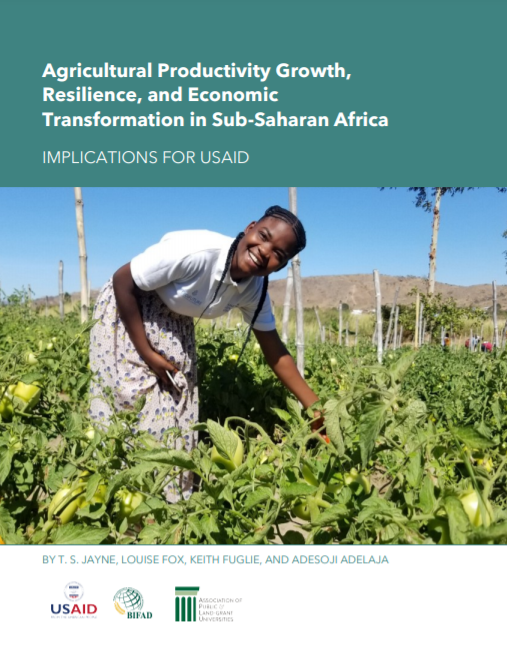
Comment
Make a general inquiry or suggest an improvement.